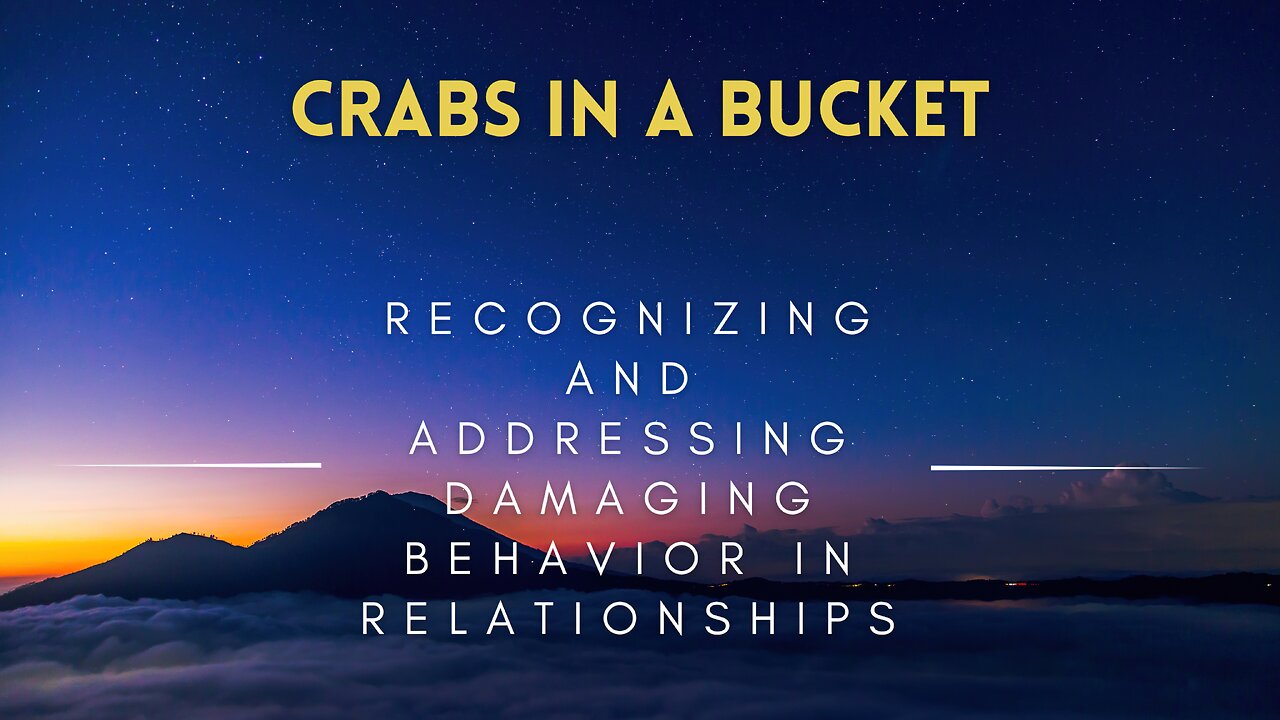Premium Only Content

19 - Crabs in a Bucket - Recognizing and Addressing Damaging Behavior in Relationships
In this compelling episode titled "Crabs in a Bucket: Recognizing and Addressing Damaging Behavior in Relationships", we explore a phenomenon that can seriously harm interpersonal relationships. Drawing parallels with the crab bucket theory, where crabs pull each other down to prevent their escape, we discuss the similar behavior patterns in human relationships. We delve into the destructive impacts of jealousy, insecurity, and resentment, which often lead individuals to sabotage their partner's success or happiness. Learn how to identify this damaging conduct, and more importantly, ways to counteract it, by fostering a culture of positivity, mutual support, and shared success. Step out of the bucket and rise together!
#crabsinabucket #relationshipadvice #toxicbehavior #jealousy #insecurity #communication #trust #relationshipgrowth #healthyrelationships #emotionalintelligence #supportiveenvironment #conflictresolution #personaldevelopment
References for Further Reading:
Burgo, J. (2015). The Narcissist You Know: Defending Yourself Against Extreme Narcissists in an All-About-Me Age (Reprint edition). Touchstone.
Dibble, J. L., Levine, T. R., & Park, H. S. (2012). The Unidimensional Relationship Closeness Scale (URCS): Reliability and validity evidence for a new measure of relationship closeness. Psychological Assessment, 24(3), 565–572. https://doi.org/10.1037/a0026265
Felmlee, D. H. (1994). Who’s on top? Power in romantic relationships. Sex Roles, 31–31(5–6), 275–295. https://doi.org/10.1007/BF01544589
Gable, S. L., Reis, H. T., Impett, E. A., & Asher, E. R. (2004). What Do You Do When Things Go Right? The Intrapersonal and Interpersonal Benefits of Sharing Positive Events. Journal of Personality and Social Psychology, 87(2), 228–245. https://doi.org/10.1037/0022-3514.87.2.228
Joiner, T. E., & Metalsky, G. I. (2001). Excessive Reassurance Seeking: Delineating a Risk Factor Involved in the Development of Depressive Symptoms. Psychological Science, 12(5), 371–378. https://doi.org/10.1111/1467-9280.00369
Laurenceau, J.-P., Barrett, L. F., & Pietromonaco, P. R. (1998). Intimacy as an interpersonal process: The importance of self-disclosure, partner disclosure, and perceived partner responsiveness in interpersonal exchanges. Journal of Personality and Social Psychology, 74(5), 1238–1251. https://doi.org/10.1037/0022-3514.74.5.1238
Le, B., Dove, N. L., Agnew, C. R., Korn, M. S., & Mutso, A. A. (2010). Predicting nonmarital romantic relationship dissolution: A meta-analytic synthesis. Personal Relationships, 17(3), 377–390. https://doi.org/10.1111/j.1475-6811.2010.01285.x
Pfeiffer, S. M., & Wong, P. T. P. (1989). Multidimensional Jealousy. Journal of Social and Personal Relationships, 6(2), 181–196. https://doi.org/10.1177/026540758900600203
Rusbult, C. E., Martz, J. M., & Agnew, C. R. (1998). The Investment Model Scale: Measuring commitment level, satisfaction level, quality of alternatives, and investment size. Personal Relationships, 5, 357–391. https://doi.org/10.1111/j.1475-6811.1998.tb00177.x
Sarkis, S. M. (2018). Gaslighting: Recognize Manipulative and Emotionally Abusive People -- and Break Free. Da Capo Lifelong Books.
Tobore, T. O. (2020). Towards a Comprehensive Theory of Love: The Quadruple Theory. Frontiers in Psychology, 11, 862. https://doi.org/10.3389/fpsyg.2020.00862
Vangelisti, A. L. (2009). Challenges in conceptualizing social support. Journal of Social and Personal Relationships, 26(1), 39–51. https://doi.org/10.1177/0265407509105520
Voyer, B. G., & McIntosh, B. (2013). The psychological consequences of power on self-perception: Implications for leadership. Leadership & Organization Development Journal, 34(7), 639–660. https://doi.org/10.1108/LODJ-10-2011-0104
Weger, H., Castle, G. R., & Emmett, M. C. (2010). Active Listening in Peer Interviews: The Influence of Message Paraphrasing on Perceptions of Listening Skill. International Journal of Listening, 24(1), 34–49. https://doi.org/10.1080/10904010903466311
Resources for Further Study:
The concept of "crabs in a bucket" and its application to relationships is a widely discussed topic in self-help and relationship literature. While there is no single source for the information provided, many books, articles, and podcasts discuss this concept and provide advice on how to recognize and address damaging behavior in relationships.
Some examples of resources that cover this topic include "The Seven Principles for Making Marriage Work" by John Gottman, "The Relationship Cure" by John Gottman and Joan DeClaire, and "The Four Agreements" by Don Miguel Ruiz.
The Four Agreements is a book by Don Miguel Ruiz that outlines four principles for personal transformation and spiritual growth. While the book does not explicitly address the concept of "crabs in a bucket," the principles it outlines can be applied to situations where individuals engage in this behavior.
The first agreement is to be impeccable with your word. This means speaking with integrity, saying only what you mean, avoiding gossip and negativity, and using the power of your words to create positivity and harmony. When individuals engage in "crabs in a bucket" behavior, they often use their words to undermine and criticize others, which goes against this agreement. By being impeccable with your word, you can help to create a more positive and supportive environment in your relationships and avoid engaging in harmful behavior yourself.
The second agreement is to not take anything personally. This means recognizing that other people's words and actions are a reflection of their own beliefs and experiences, not a reflection of your worth or value. When individuals engage in "crabs in a bucket" behavior, they are often projecting their own insecurities and fears onto others, which can be hurtful and damaging. By not taking their words or actions personally, you can avoid getting caught up in their negativity and maintain your own sense of self-worth and confidence.
The third agreement is to not make assumptions. This means asking questions and seeking clarity rather than jumping to conclusions or making assumptions about others' intentions or motivations. When individuals engage in "crabs in a bucket" behavior, they often make assumptions about others' motives or intentions without seeking to understand their perspective. By not making assumptions, you can avoid misunderstandings and conflicts and build more positive and supportive relationships.
The fourth agreement is to always do your best. This means putting in your best effort, even when things are challenging or difficult, and being compassionate and forgiving with yourself when you fall short. When individuals engage in "crabs in a bucket" behavior, they often give in to their own fears and insecurities and fail to do their best. By always doing your best, you can overcome these fears and insecurities and build a more positive and supportive relationship with yourself and others.
Overall, while The Four Agreements does not specifically address "crabs in a bucket" behavior, its principles can be applied to create a more positive and supportive environment in relationships and avoid engaging in harmful behavior yourself.
Additionally, many online blogs and forums discuss the "crabs in a bucket" concept and offer personal anecdotes and advice for how to overcome this behavior.
-
 LIVE
LIVE
LFA TV
15 hours agoLIVE & BREAKING NEWS! | FRIDAY 10/31/25
3,960 watching -
 LIVE
LIVE
The Mel K Show
59 minutes agoHunters Become the Hunted: A Reckoning Is Finally Coming - 10/31/25
162 watching -
 LIVE
LIVE
Outspoken with Dr. Naomi Wolf
58 minutes ago"The Devil His Due"
41 watching -
 1:02:27
1:02:27
VINCE
3 hours agoA Very Trump Halloween | Episode 159 - 10/31/25
108K44 -
 LIVE
LIVE
Badlands Media
10 hours agoBadlands Daily: October 31, 2025
2,704 watching -
 1:34:28
1:34:28
Graham Allen
3 hours agoSCARY: Kamala Had MELT DOWN Over Trump!! Does LSU Hate Charlie Kirk?! + Top Halloween Movies Of ALL TIME!!
73.8K37 -
 LIVE
LIVE
Caleb Hammer
1 hour agoShe Blames MAGA For Her Debt | Financial Audit
267 watching -
 LIVE
LIVE
The Big Mig™
3 hours agoWhat To Give The Man Who Has EVERYTHING!
5,134 watching -
 1:32:16
1:32:16
Benny Johnson
2 hours agoSHOCK: Massive Food Stamp FRAUD Exposed: 59% of Welfare are Obese Illegal Aliens!? Americans RAGE…
22K45 -
 2:59:52
2:59:52
Wendy Bell Radio
7 hours agoAmerica Deserves Better
38.5K73